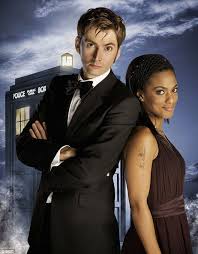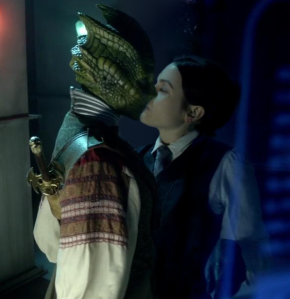Fifty years is a long time for any show to be on the air, especially when that show ran during a turbulent time in history. While the Cold War and the Civil Rights Movement in America raged, “Doctor Who” told stories about history and science. In its over 800 episodes, several specials and television movies, it has grown and gained more diversity in race representation, both human and alien, gender roles and representation and sexual orientation representation. Despite public opinion often targeting the lack of diversity in today’s television and film industry, “Doctor Who” still shows more diversity than many other shows on television in spite of what some critics say.

The Tenth Doctor (David Tennant) and Martha Jones (Freema Agyeman) pose in the season three promo.
In an article from DailyMail, Australian author Lindy Orthia claimed that “Doctor Who” often treats black companions as “second-class” people, even though the show had two black characters in main roles, Mickey Smith and Martha Jones, who were two of the first companions in the continuation of “Doctor Who” and were treated the same as the white characters in accordance to the plot.
However, Orthia also claims that the show has racism within its roots when in the very first episode, “William Hartnell’s Doctor compares the disbelief of his new companions when they first enter the TARDIS with the Red Indian ‘whose savage mind disbelieved steam trains’.” Orthia neglects to remember that the dialogue from the first episode was written in 1963, in which saying something racist on television was seen as acceptable then, but it’s not acceptable today. The cultural differences between today’s “Doctor Who” and the classic series reflect how the show’s attitude has grown with the times.
“I think they have a lot of diversity in a lot of different ways,” Malika Reeves, University of the Cumberlands student and Whovian, said. “They don’t just focus on just the human race because it’s a fictional show, but they look at everything, not just the color of your skin.”

Captain Jack Harkness (John Barrowman) at the end of his first appearance in the first season of “Doctor Who.”
Race isn’t the only diversity the continuation of “Doctor Who” has focused on. Gay rights is prevalent in today’s society, especially in America, so writers have created characters who are homosexual and bisexual without that being the only trait to their character. Captain Jack Harkness, who first appears in season one, is bisexual, but “Doctor Who” makes him more than that. He’s no stereotype and an important character to the show and to the “Doctor Who” universe, in which his character stars in a spinoff of “Doctor Who” called “Torchwood.” He is known to be dashing, morally ambiguous and brave to fans.
Most recently, two characters, the lizard-woman Madame Vastra and her human wife, Jenny Flint, are married and shared an on-screen kiss that upset some viewers of the season eight premiere. According to The Independent, a British online publication, many people felt “Doctor Who” was “promoting a gay agenda” and have a “pro-gay bias.”

Madame Vastra (Neve McIntosh) and Jenny Flint (Catrin Stewart) kiss in character, in which they are married.
“The BBC has a fundamental obligation to serve all its audiences,” Tim Davie, acting director general and chair of the BBC Working Group, said in a statement for Huffington Post. “I’m proud to have led this work for three years, and this review underlines our commitment and sets a direction for the work to continue.”